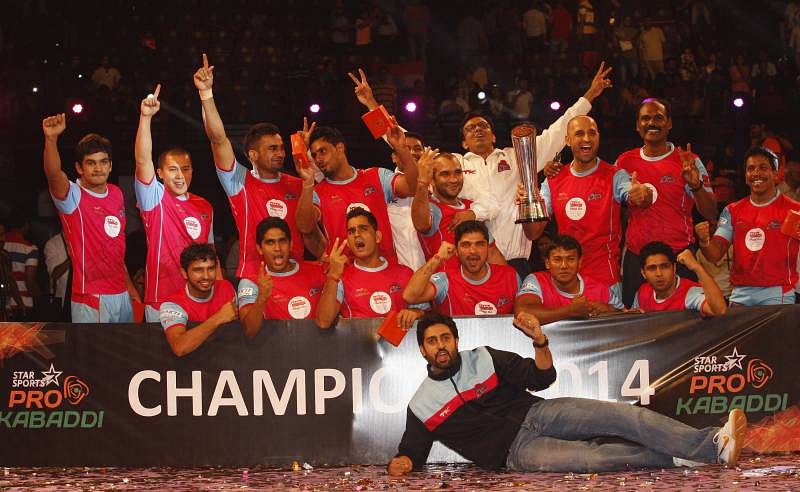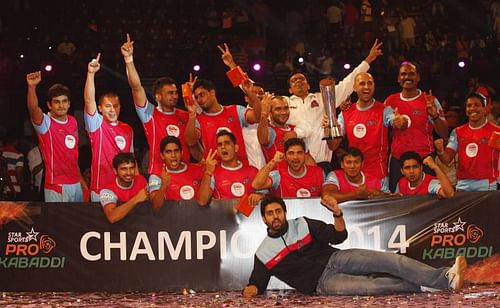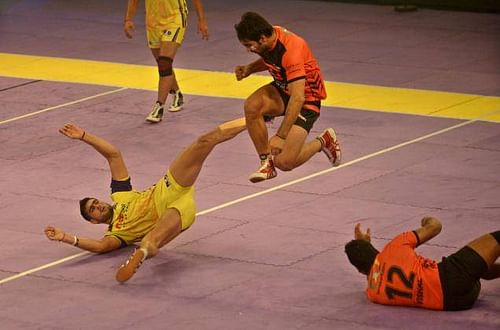
How the teams fared in Pro Kabaddi League season 1

Kabaddi, a game born and mastered in our country since the medieval times, found a new meaning with the introduction of Star Sports Pro Kabaddi League (PKL), a tournament based on the lines of the IPL. Played in the rural areas of our country with a lot of seriousness and pride, the game was introduced to the urban masses on a national platform last year, who gladly embraced it with open arms. The teams participating in the tournament were cheered on by their supporters from all over the country.
PKL was the brainchild of Charu Sharma, the Managing Director of Mashal Sports. Star Sports was the official broadcaster and central sponsor. It had the backing of International Kabaddi Federation, Asian Kabaddi Federation and Amateur Kabaddi Federation of India. 8 teams from cities across India took part in the tournament. These teams were from Delhi, Mumbai, Patna, Vizag, Jaipur, Bengaluru, Kolkata and Pune.
There were in total 60 matches played, with 56 in the first round, 2 semi-finals, and a match each for the final and third position. The first match was played on July 26, 2014, and the final was played on August 31, 2014. The first semi-final was played between the Patna Pirates and the Jaipur Pink Panthers, with Jaipur winning the match 38-18. The second semi-final was played between U Mumba and the Bengaluru Bulls, with U Mumba winning the match 27-23.
Patna Pirates came third, after their victory over Bengaluru Bulls 29-22 in the match for the third position. The final was played between U Mumba and Jaipur Pink Panthers at Sardar Vallabh Bhai Patel Indoor Stadium, Mumbai, with Jaipur Pink Panthers emerging victorious, beating U Mumba 35-24 to become the first champions of PKL.
The auctions of the players took place on May 20, 2014 in Mumbai. Indian captain Rakesh Kumar was the costliest player, having been bought by Patna for 12.8 lakhs. A total of 96 players were auctioned. They were divided into three categories – A, B, C. Out of these, 24 were foreign players. Players from Pakistan, Bangladesh, Sri Lanka, Nepal, Iran, Japan, the UK, Indonesia, South Korea, Oman, Taiwan, Kenya and Turkmenistan took part in the tournament.
The teams
Jaipur Pink Panthers was the most successful team, winning 10 of their 14 round robin matches. They also went on to win the League, beating U Mumba in the final. The team, based in Jaipur, Rajasthan is owned by Abhishek Bachchan, and led by Navneet Gautam. Kasinathan Baskaran coached the team for the first season. Maninder Singh was one of the top 3 raiders in the tournament, with 130 points while Rohit Rana led the defence, scoring 37 points in the process.
The team from Mumbai, Maharashtra – U Mumba finished as the runners-up. They were captained by Anup Kumar and coached by Ravi Shetty while national team coach, Bhaskaran Edachery played the role of the strategic advisor. They played their home matches at the National Sports Club of India, Mumbai. The team is owned by Unilazer Sports. Anup Kumar was the most successful raider of the tournament, with a total of 155 points, gathering the MVP award at the end of the tournament. Surender Nada was also one of the most successful defenders of the tournament, with 48 points.
Patna Pirates, based in Patna, Bihar, came third in the League. They were one of the four semi-finalists for Season 1. The team was coached by R S Khokhar, and led by Rakesh Kumar, who was the most expensive player in the auction, at Rs. 12.8 lakhs. The team is owned by Rajesh Shah, and they play their home matches at the Kankarbagh Indoor Stadium. Some players who performed well for the team were Ravi Dalal, Sandeep Narwal, and Suresh Kumar.
Bengaluru Bulls, who came fourth in the tournament, from Bengaluru, Karnataka finished as semi-finalists. The team was led by Manjit Chillar and coached by Randhir Singh. The team is owned by Kosmik Global Media. They play their home matches at the Kanteerava Indoor Stadium. Players who had a decent show for the team were Manjit Chillar, who was the best defender of the tournament with 51 points while Dharmaraj Cheralathan, and Ajay Thakur were amongst the top 5 raiders.

Telugu Titans finished fifth in the tournament. Based in Vizag, Andhra Pradesh, the team is owned by Veera Sports. They play their home matches at Port Trust Golden Jubilee Stadium. The team was led by Rajaguru Subramanian and coached by J Udayakumar. Rahul Chaudhari made the team proud by finishing second in the list of top raiders with 151 points.
Dabang Delhi didn’t have a good tournament, as they finished sixth. Led by Jasmer Singh and coached by Arjun Singh, the team is owned by Do It Sports Management. They played their home matches at the Thyagaraj Sports Complex. Despite a lacklustre performance by the team, there was a ray of hope for the team in the form of Kashiling Adake and Surjeet Narwal, who did very well as raiders. Jasmer Singh, the captain, got the third most points among defenders in the first season.
Bengal Warriors, owned by Future Group, didn’t have things going their way as they finished seventh in the tournament. Based in Kolkata, West Bengal, the team was captained by Nilesh Shinde and coached by Raj Narain Sharma. Puneri Paltan, a team based in Pune, Maharashtra, disappointed many as they finished last in the tournament. Owned by Insurekot Sports and coached by Ramphal Kaushik, the team was led by Wazir Singh. The Bengal Warriors and Puneri Paltan did not live up to expectations and barely did anything noteworthy in the tournament.
Overall, the tournament was a grand success, with a lot of interest and revenue generated. The players, coaches, owners, promoters were happy, but most of all, the fans were ecstatic for getting something refreshing and totally different. The interest shown by the fans in PKL was totally unexpected. The success and acceptance of PKL Season 1 by the Indian audience motivated and encouraged the promoters to have a second season, soon to start on July 18, 2015, with U Mumba and Jaipur Pink Panthers facing each other in the first match again. Let’s hope the tournament turns out to be as successful as the first one, if not more.